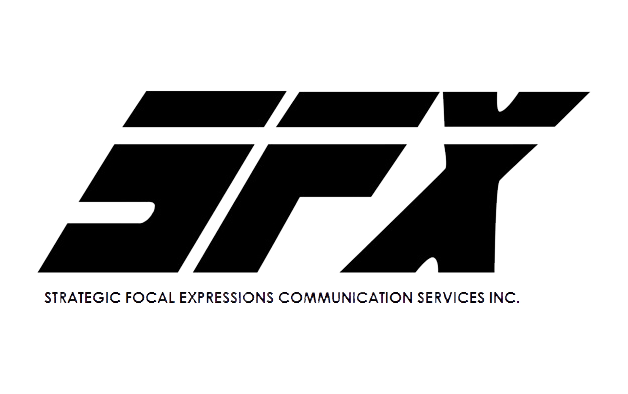You can attend the courses at your convenience wherever you are; even pause and continue at a later time until you finish. For starters, we’d like you to have the right frame of mind with minimal or zero distractions around you when taking the courses. The courses are all in video format, are easy to follow and to understand.
When viewing a course video, we encourage you to write down your questions and clarifications, if any, and to submit them to your company representative who will be forwarding them, in turn to SFX.
Provisional OGEL Participant
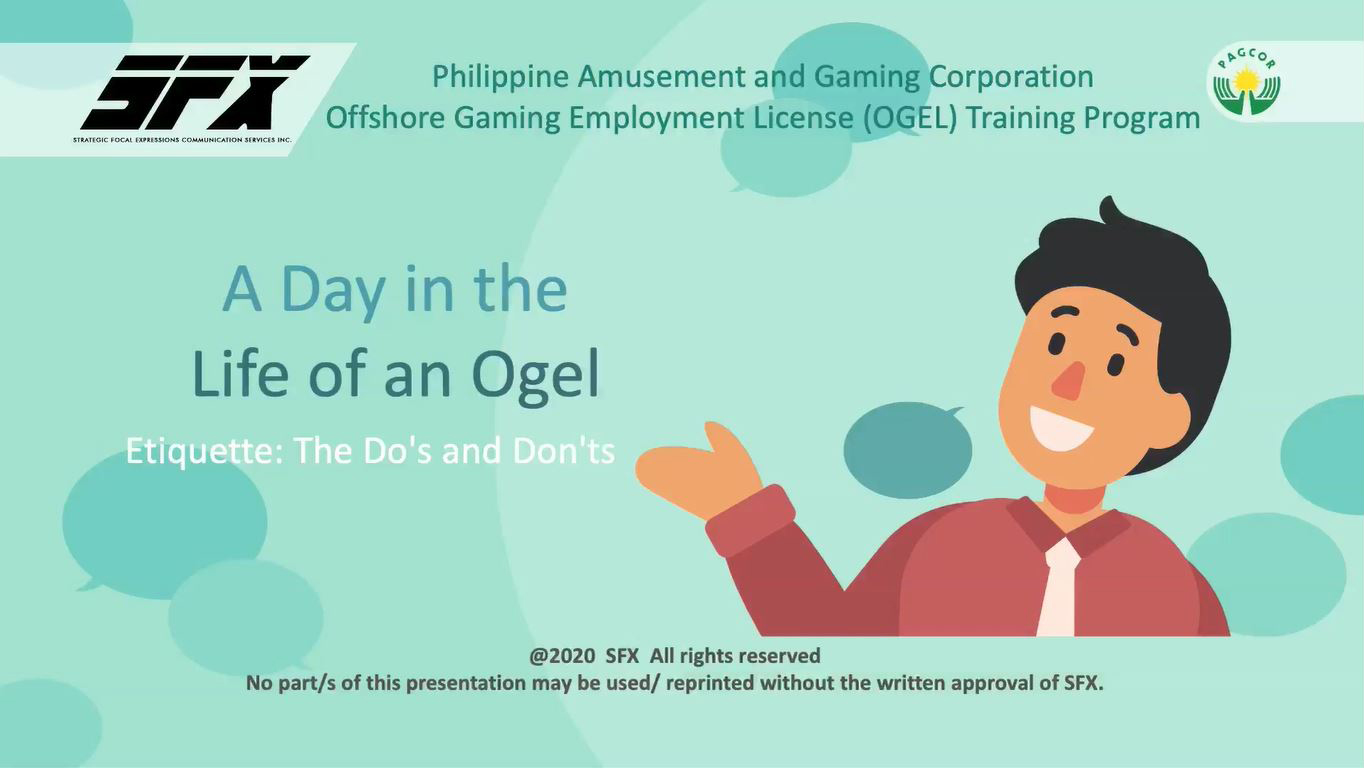
Basic Etiquette: Do's and Dont's
see moreThis course enables the training participant to appreciate the value of acquiring and performing the appropriate behavior in any given situation, whether one is interacting with colleagues at work or with ordinary citizens in the general community. The lessons are going to be useful in maintaining smooth interpersonal relations, promoting good neighborliness, as well as upholding law and order.
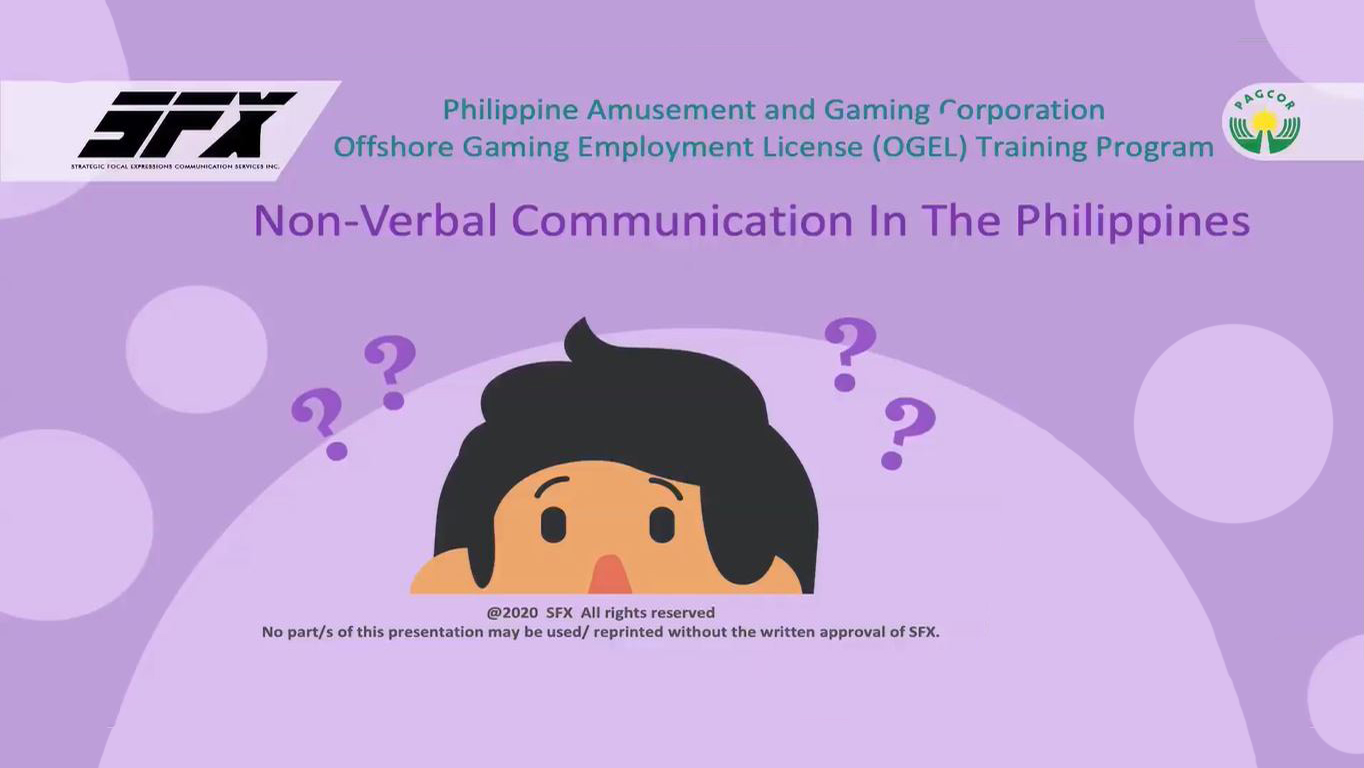
Non-verbal Communication
see moreThis course is helpful for foreign nationals staying in the Philippines because it illustrates the non-verbal cues that Filipinos are accustomed to using in order to communicate what they mean or otherwise wish to say. Through the widely accepted use of hand gestures, head movements, and even of various parts of the face, the recognition of these cues will surely make one’s life easier especially when it comes to asking for directions, using public transportation, and dining in a restaurant.
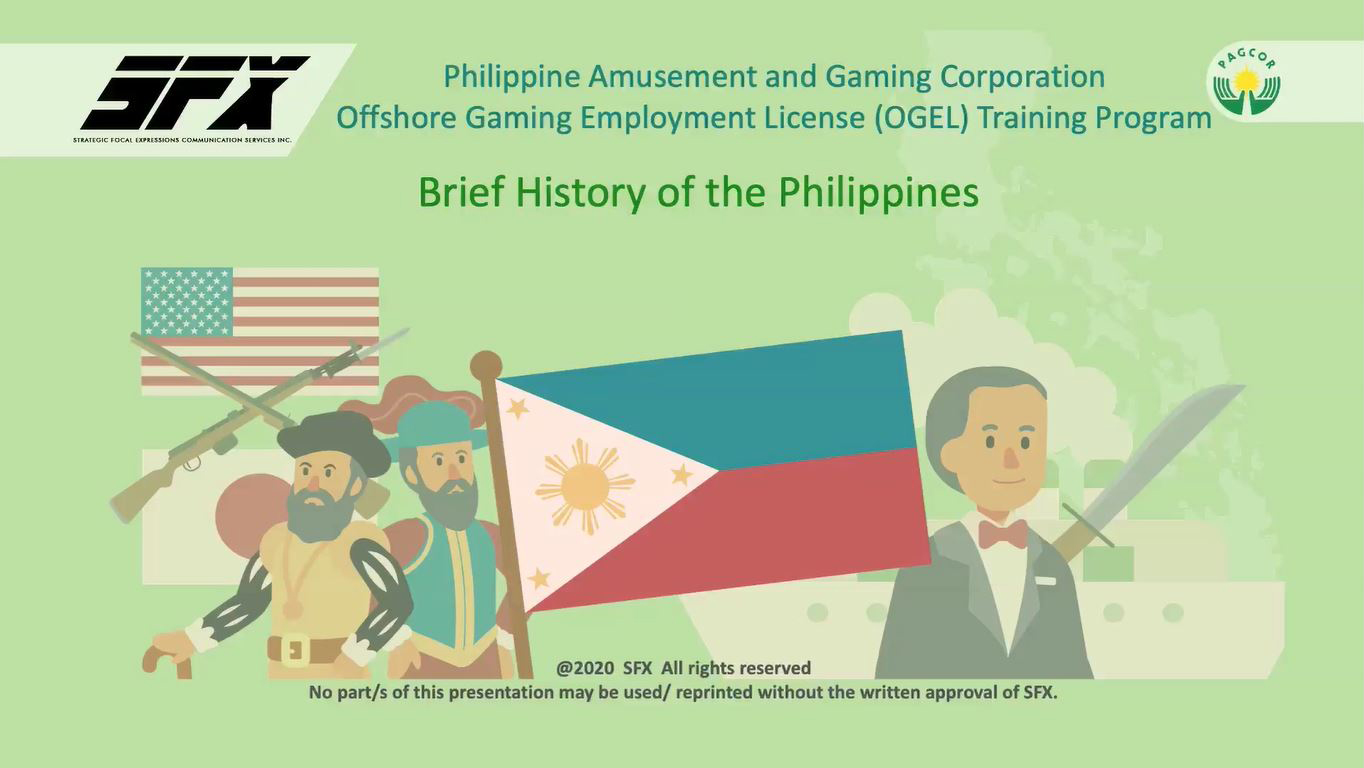
Philippine History and Culture
see moreThis course familiarizes the training participant with the colorful history as well as diverse culture of the Philippines, starting from the colonial period to the declaration of independence. It discusses the various influences that have enriched and made Filipino culture as dynamic and vibrant as it is today. It also highlights the historical significance of Philippine-China relations in broadening the future of both countries together with the rest of Asia.

Basic Philippine Law for Foreign Workers
see moreThis course examines five sets of laws in the Philippines that a non-resident alien or expatriate deriving income as an employee in the Philippines should be aware of, namely, according respect for the Philippine flag, observance of traffic laws, including the laws on anti-littering, prohibited drugs, and immigration. It aims to provide participants with a better understanding of the rules and regulations that they need to follow in order to enable them to perform gainful work lawfully as well as harmoniously. Upon arrival in the Philippines, a non-resident alien or expatriate may soon find out that the conditions here may greatly differ from one's place of origin, so it is with this in mind that the course has also been designed to be easy and simple to understand.
Regular OGEL - Rank and File Participant

Basic Etiquette: Do's and Dont's
see moreThis course enables the training participant to appreciate the value of acquiring and performing the appropriate behavior in any given situation, whether one is interacting with colleagues at work or with ordinary citizens in the general community. The lessons are going to be useful in maintaining smooth interpersonal relations, promoting good neighborliness, as well as upholding law and order.

Non-verbal Communication
see moreThis course is helpful for foreign nationals staying in the Philippines because it illustrates the non-verbal cues that Filipinos are accustomed to using in order to communicate what they mean or otherwise wish to say. Through the widely accepted use of hand gestures, head movements, and even of various parts of the face, the recognition of these cues will surely make one’s life easier especially when it comes to asking for directions, using public transportation, and dining in a restaurant.

Philippine History and Culture
see moreThis course familiarizes the training participant with the colorful history as well as diverse culture of the Philippines, starting from the colonial period to the declaration of independence. It discusses the various influences that have enriched and made Filipino culture as dynamic and vibrant as it is today. It also highlights the historical significance of Philippine-China relations in broadening the future of both countries together with the rest of Asia.

Basic Philippine Law for Foreign Workers
see moreThis course examines five sets of laws in the Philippines that a non-resident alien or expatriate deriving income as an employee in the Philippines should be aware of, namely, according respect for the Philippine flag, observance of traffic laws, including the laws on anti-littering, prohibited drugs, and immigration. It aims to provide participants with a better understanding of the rules and regulations that they need to follow in order to enable them to perform gainful work lawfully as well as harmoniously. Upon arrival in the Philippines, a non-resident alien or expatriate may soon find out that the conditions here may greatly differ from one's place of origin, so it is with this in mind that the course has also been designed to be easy and simple to understand.
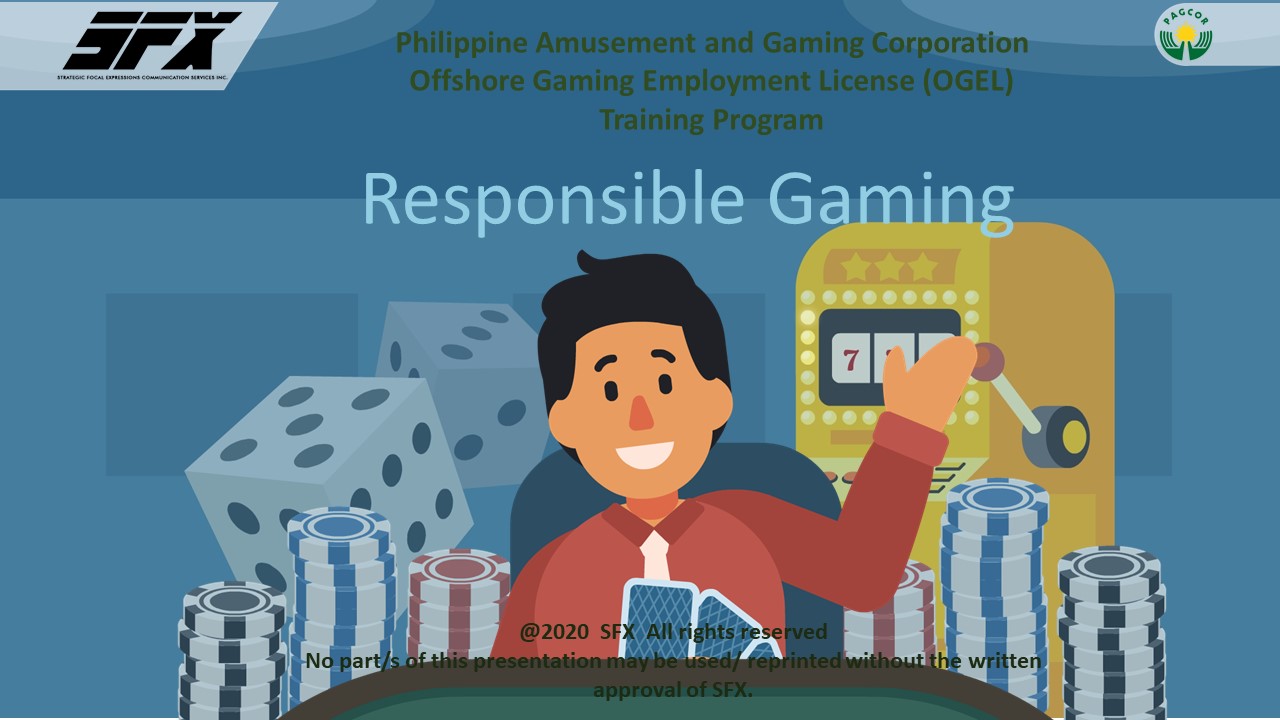
Responsible Gaming
see moreThis course introduces the training participant to the primary stakeholders that make up the offshore gaming industry, including the critical role each one is expected to play in order to ensure that the industry remains mutually beneficial, wholesome, non-addictive, and crime-free. It also attempts to positively influence the mindsets, attitudes, and behaviors of service providers to aspire for the highest form of responsibility to their customers by demonstrating continuous care and the utmost concern for them.
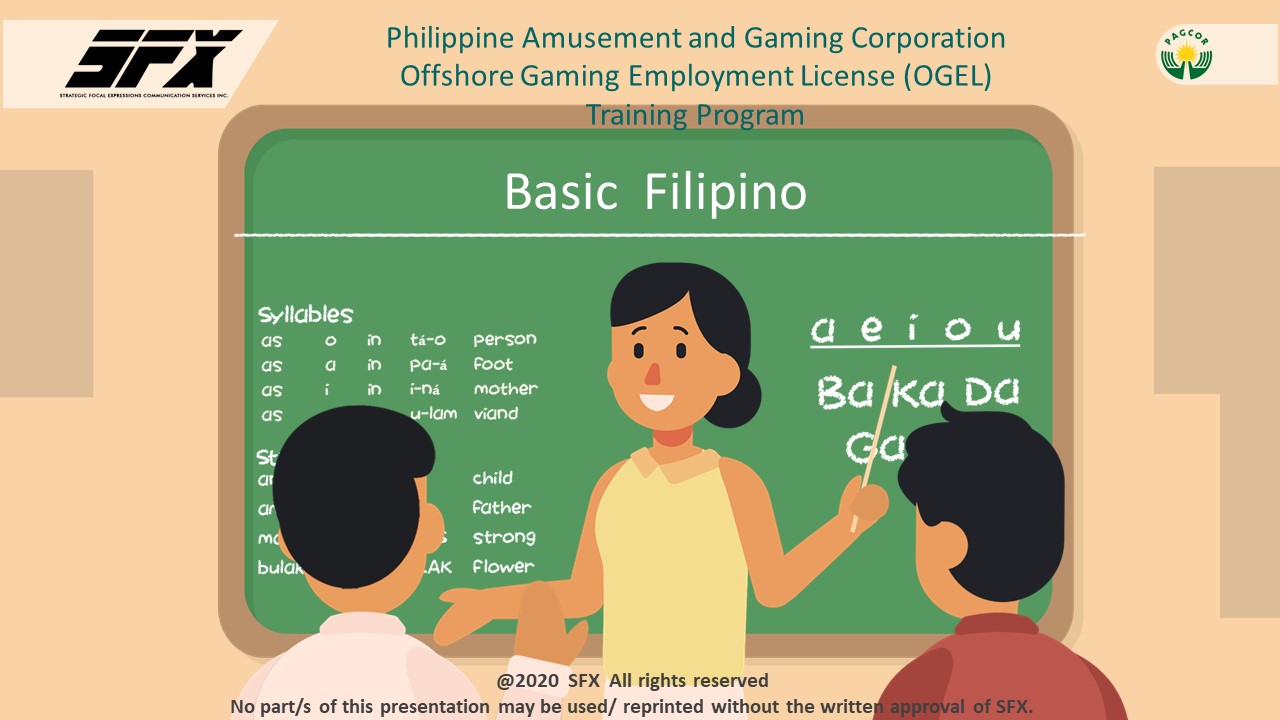
Basic Filipino
see moreThis course aims to teach the rudiments of the Filipino language to a training participant who is registered as a Regular OGEL (Rank and File Participant). Filipino is the national language and is also commonly referred to as “Tagalog.” Tagalog is one of the eight major dialects in the Philippines and is widely spoken. The course introduces the participants to the Tagalog alphabet, its syllables and stresses, including everyday expressions while providing one a chance to practice simple conversations.
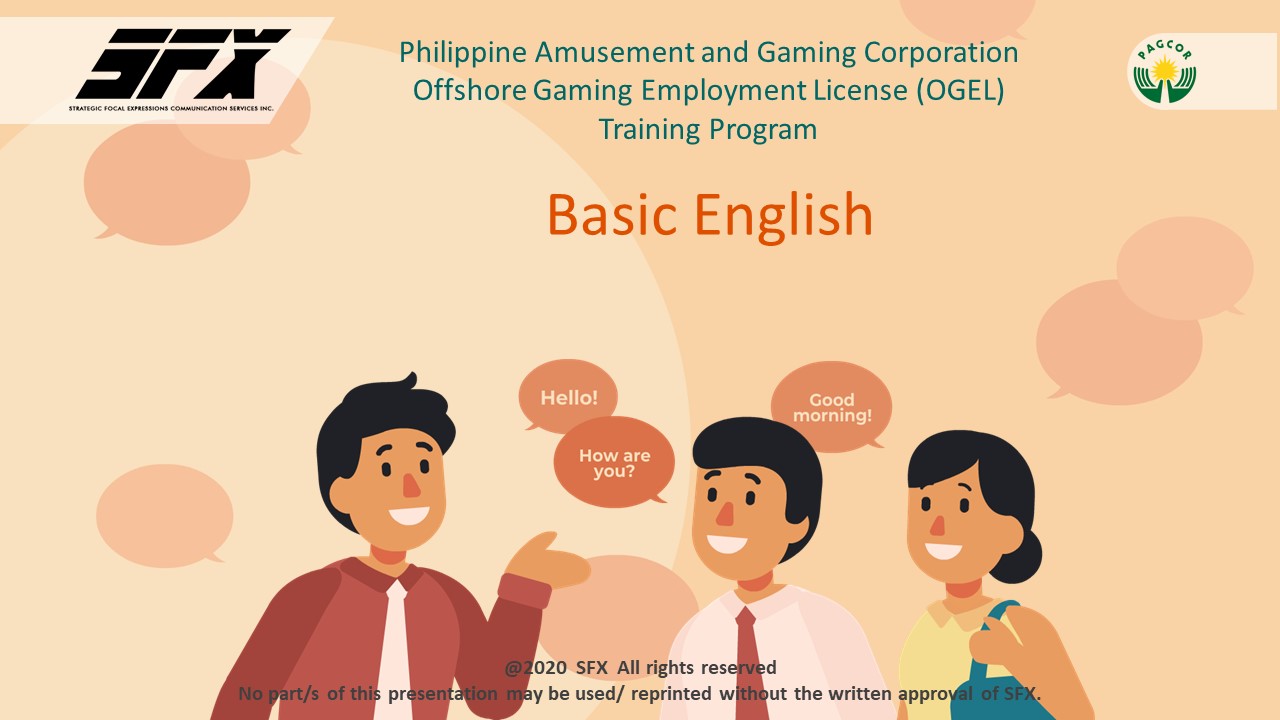
Basic English
see moreThis course aims to teach the rudiments of the English language to a training participant who is registered as a Regular OGEL (Rank and File Participant). The course will enable the participant to function as effectively as possible while staying or working in the Philippines since it likewise reinforces the value of politeness and constant practice of good conduct both in the workplace and general community. It is designed to complement the lessons in another course of the participant entitled “Basic Etiquette: Do’s and Dont’s.”
Regular OGEL - Supervisory and Managerial Participant

Basic Etiquette: Do's and Dont's
see moreThis course enables the training participant to appreciate the value of acquiring and performing the appropriate behavior in any given situation, whether one is interacting with colleagues at work or with ordinary citizens in the general community. The lessons are going to be useful in maintaining smooth interpersonal relations, promoting good neighborliness, as well as upholding law and order.

Non-verbal Communication
see moreThis course is helpful for foreign nationals staying in the Philippines because it illustrates the non-verbal cues that Filipinos are accustomed to using in order to communicate what they mean or otherwise wish to say. Through the widely accepted use of hand gestures, head movements, and even of various parts of the face, the recognition of these cues will surely make one’s life easier especially when it comes to asking for directions, using public transportation, and dining in a restaurant.

Philippine History and Culture
see moreThis course familiarizes the training participant with the colorful history as well as diverse culture of the Philippines, starting from the colonial period to the declaration of independence. It discusses the various influences that have enriched and made Filipino culture as dynamic and vibrant as it is today. It also highlights the historical significance of Philippine-China relations in broadening the future of both countries together with the rest of Asia.

Responsible Gaming
see more
This course introduces the training participant to the primary stakeholders that make up the offshore gaming industry, including the critical role each one is expected to play in order to ensure that the industry remains mutually beneficial, wholesome, non-addictive, and crime-free. It also attempts to positively influence the mindsets, attitudes, and behaviors of service providers to aspire for the highest form of responsibility to their customers by demonstrating continuous care and the utmost concern for them. In addition, a supervisory and managerial participant who takes the course will also be required to reflect as to how the lessons learned from responsible gaming can be further reinforced and upheld in the workplace with the cooperation of their direct reports.
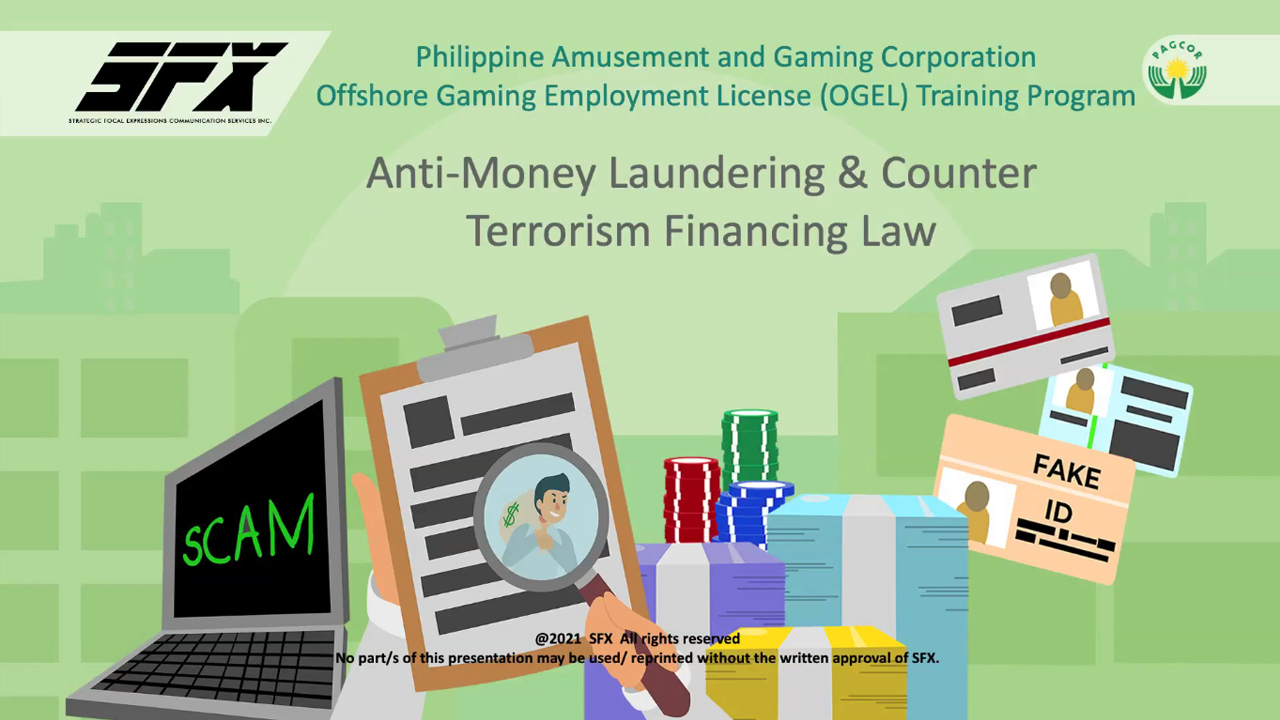
Anti Money Laundering & Counter Terrorism Financing Law
see more
This course is one of several law-related courses required by PAGCOR for the applicants for regular OGEL holding supervisory and managerial positions. The course discusses what money laundering is, what the various stages of such a crime are, including how it is linked to other crimes. It gives equal attention to the menace of terrorism financing and how it can be suppressed if not altogether prevented. The participant will learn about the systems, mechanisms and channels of money laundering and financing terrorism; as well as the critical role the casinos and gaming institutions are required by law to play since they are covered by the Anti-Money Laundering Act. Through the course, it is expected that the participants will be able to do their part in ensuring that the industry keeps a wholesome image, remains crime-free and orderly by increasing their knowledge in such aspects as compliance, internal control and audits, profiling and monitoring, reporting of suspicious activities and individuals, and the operation of a fully functioning risk management system.
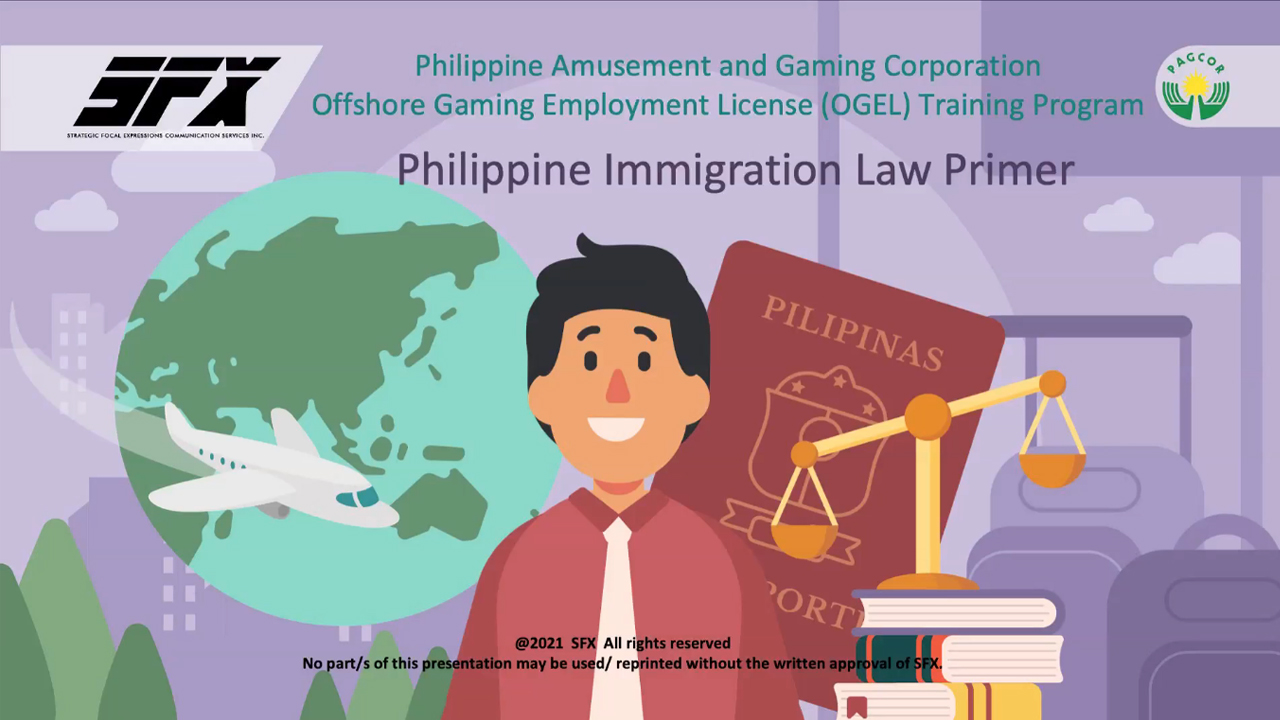
Philippine Immigration Law Primer
see more
This course is one of several law-related courses required by PAGCOR for the applicants for regular OGEL holding supervisory and managerial positions. It enables the training participant to become acquainted with the pertinent provisions of the Philippine Immigration Act as a foreigner employed in the Philippines. The course provides practical knowledge such as who qualifies as an immigrant and nonimmigrant, the visa types, causes of visa cancellation and detention, who can actually be deported, and what documents need to be obtained in order to work like an Alien Employment Permit (AEP) and Taxpayer Identification Number (TIN).

Philippine Corporate Taxation Law Primer
see more
This course is one of several law-related courses required by PAGCOR for the applicants for regular OGEL holding supervisory and managerial positions. The course provides the participant with a broad introduction of the Philippine tax system. It begins by explaining the difference between the income tax that must be paid to the government by an individual on one hand, and by a corporation on the other. It acquaints the participant with the duties of an alien working in the Philippines under the Comprehensive Tax Reform Program. Essential information on tax rates, exemptions, filing, and related government rulings are likewise included in the course.
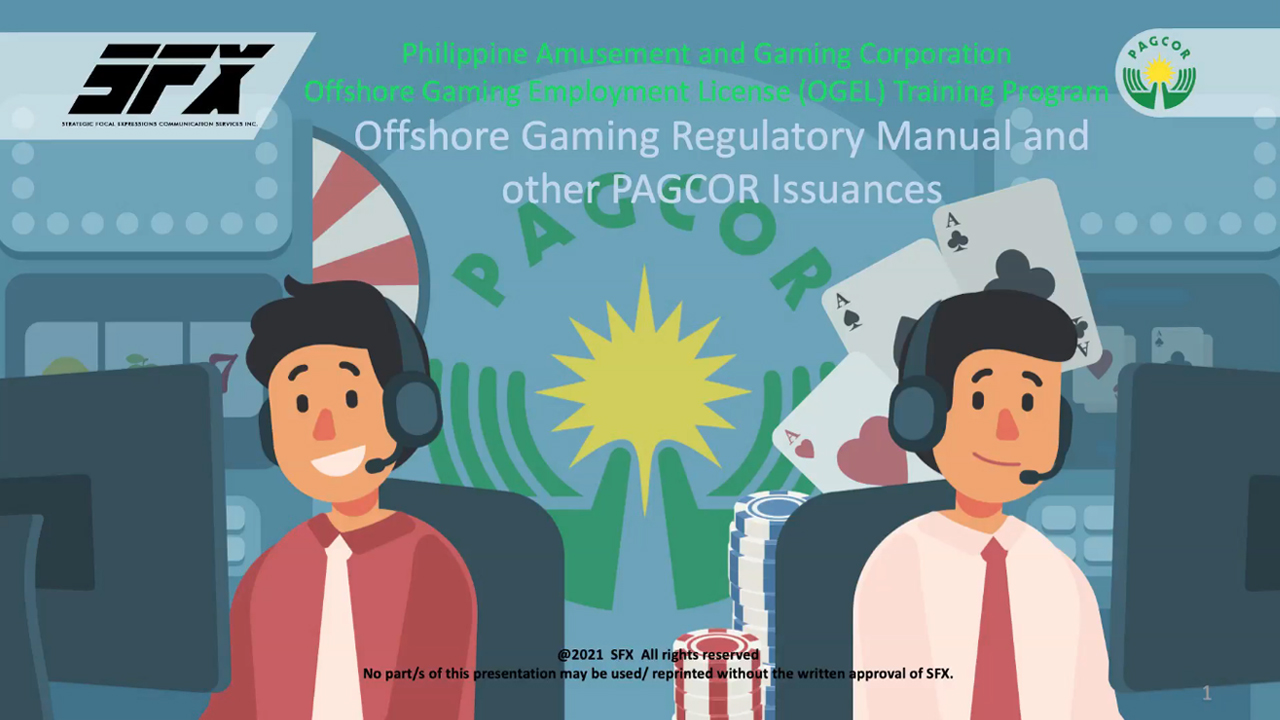
Offshore Gaming Regulatory Manual and other PAGCOR Issuances
see more
This course discusses the offshore gaming policies that have been established and are being enforced by PAGCOR to ensure a rule-based, compliant, orderly and well functioning industry. It is intended for regular OGEL holding supervisory and managerial positions who have a big role to play both in upholding these policies and communicating them to their subordinates to likewise adhere to. The policies are contained in the PAGCOR’s Offshore Gaming and Regulatory Manual (OGRM) and other subsequent issuances that are also posted in its website for ready reference. The manual has ten regulations that include, among others, the licensing of POGOs, application process, accreditation of allied services such as a local gaming agent, service providers and POGO Hub.
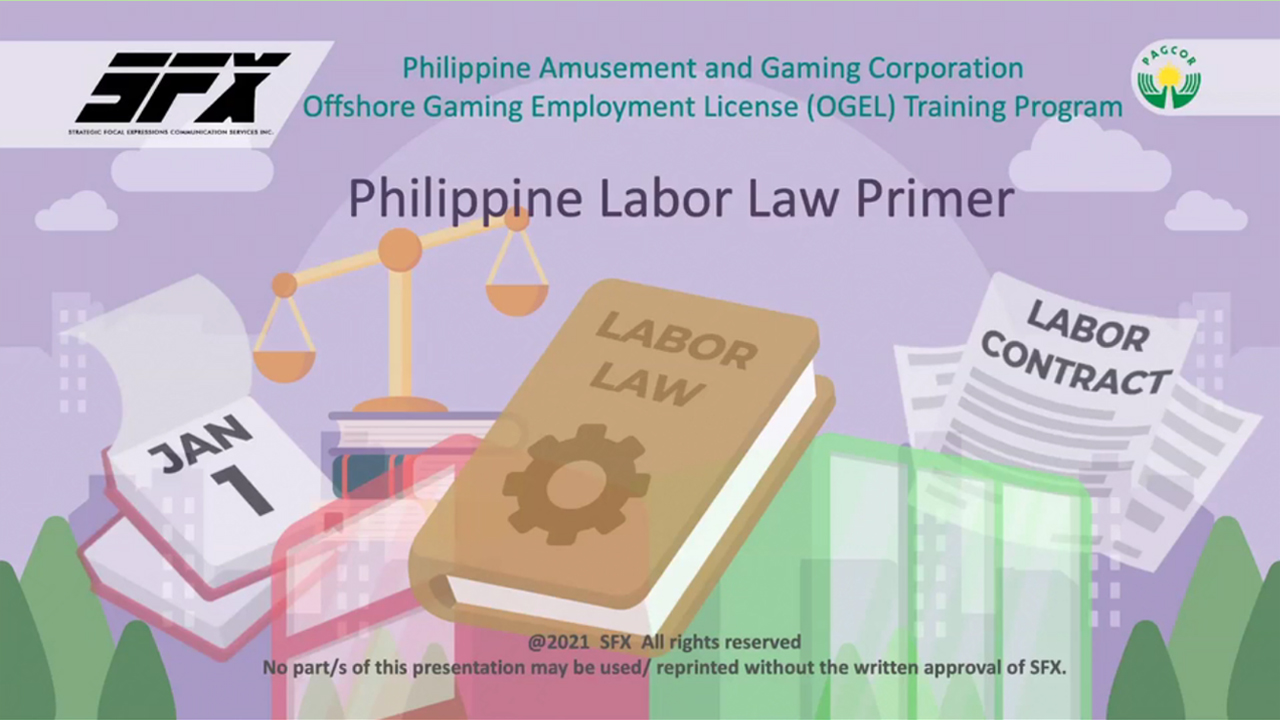
Philippine Labor Law Primer
see moreThis course is one of several law-related courses required by PAGCOR for the applicants for regular OGEL holding supervisory and managerial positions. It provides the training participant with the knowledge intended to safeguard both their employment rights and benefits as foreign nationals working in the Philippines. Among the topics that are covered by the course are: a) the significance of having an Alien Employment Permit (AEP); b) labor standards with reference to coverage, working hours, wages, leaves, and termination of employment; and c) labor relations affecting their employment.
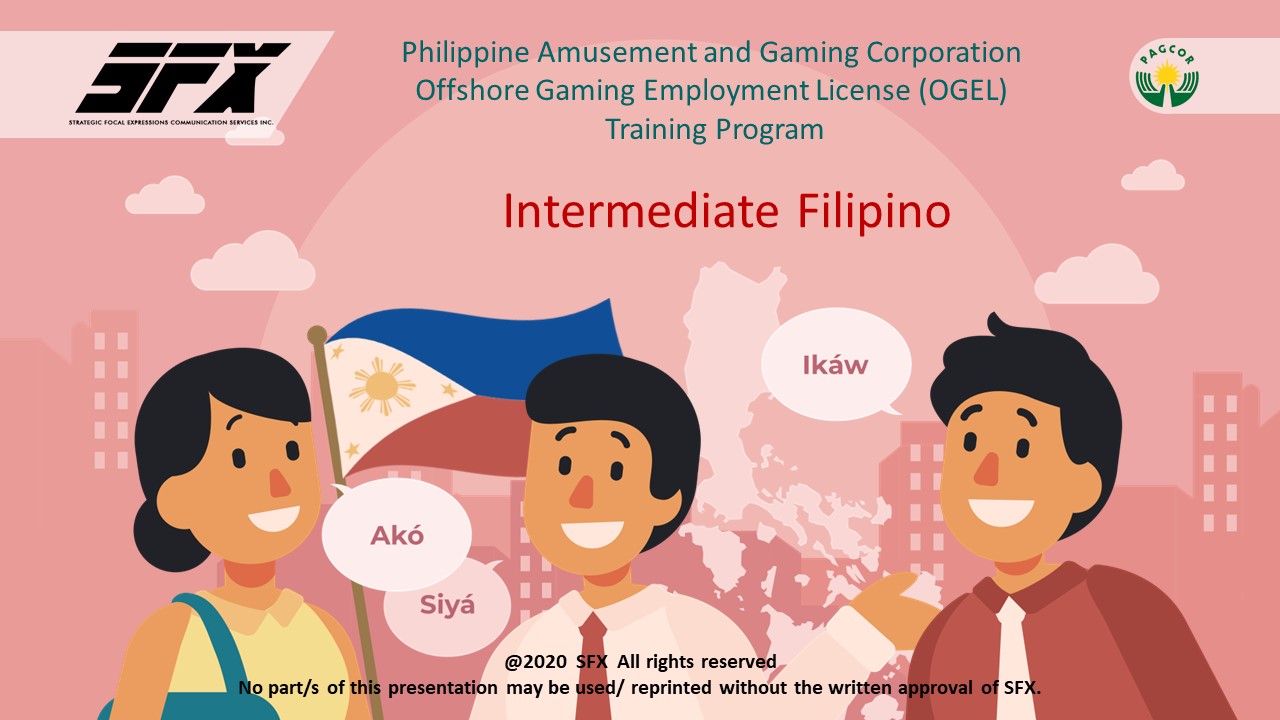
Intermediate Filipino
see moreThis course aims to teach Filipino, the national language which is also called “Tagalog,” to a training participant who is registered as a Regular OGEL (Supervisory and Managerial Participant). Understanding and learning to speak everyday Filipino words, phrases and even sentences are not really difficult. The course walks the participant through the use of personal pronouns such as I, you, she and he; as well as demonstrative pronouns like the words this and that. The course also teaches the participant how to ask ordinary questions that will come in handy when looking for someone, making introductions, asking for directions, and inquiring about something.
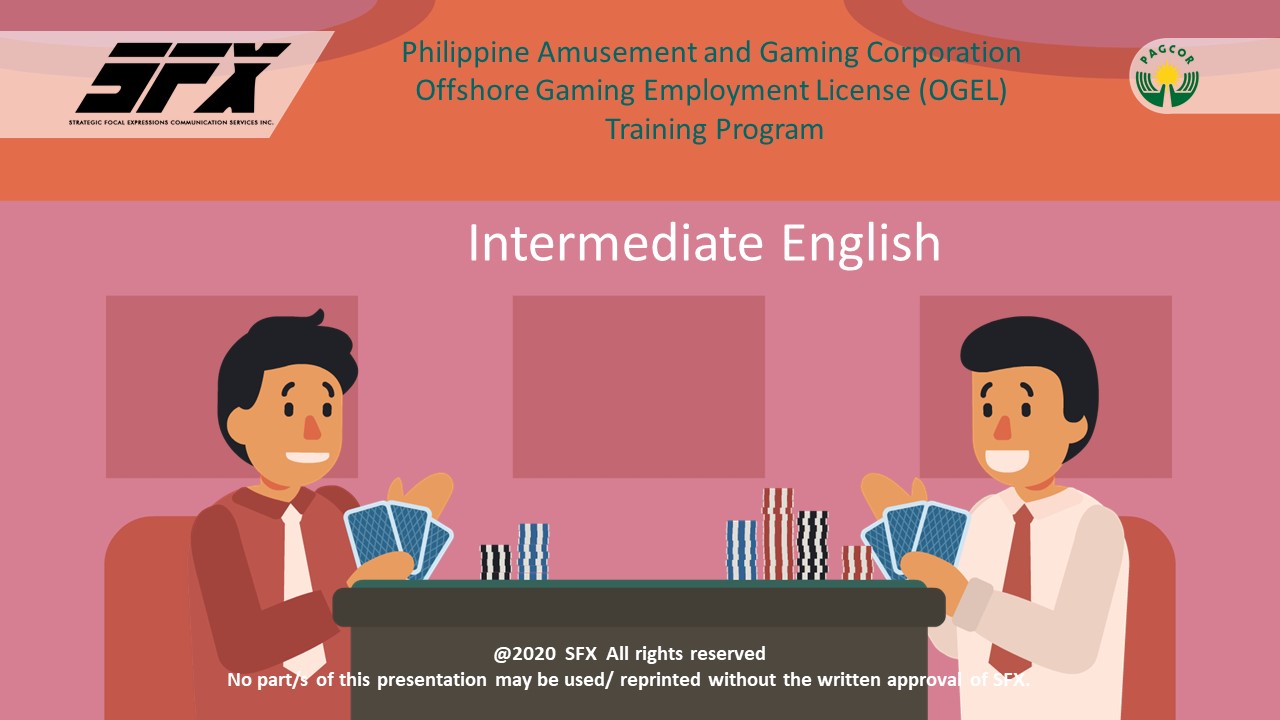
Intermediate English
see moreThis course aims to teach the English language to a training participant who is registered as a Regular OGEL (Supervisory and Managerial Participant). The course will introduce words, phrases and sentences that were all chosen carefully and are slightly more complex, but can aid in the participant’s comprehension as well as level of confidence in understanding and even using everyday English words and expressions. In order to give the course a more practical application, it was designed to make use of the common terms and concepts in “Responsible Gaming,” which incidentally, is also a course that the subordinates of the training participant are being required by PAGCOR to take.





